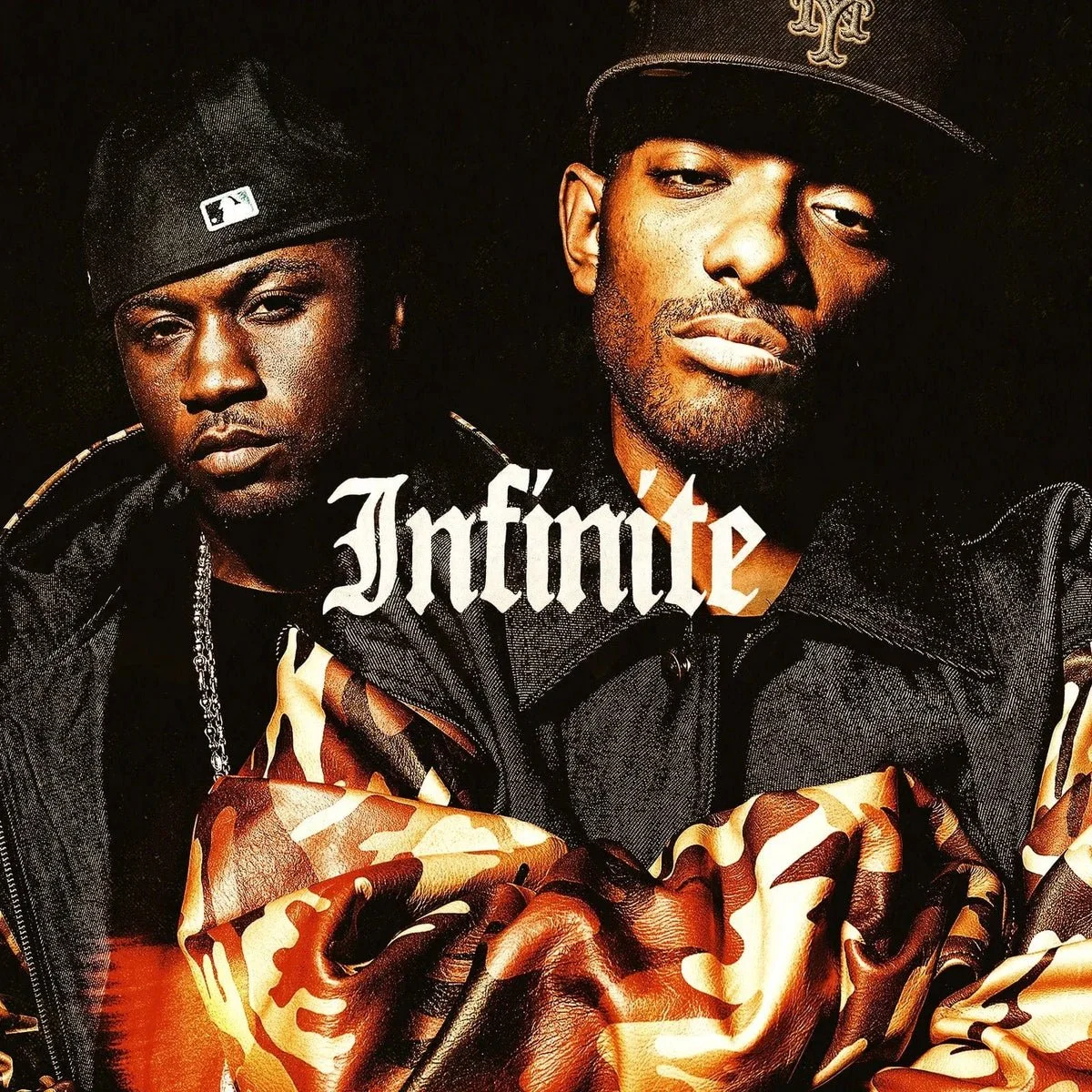Mobb Deep - Infinite: The Immortal Sound of Queensbridge Lives On
ARTICLE: JB PRYOR
Introduction & Context
With Infinite, Mobb Deep deliver what may stand as their final full-length statement: it’s the first LP since Prodigy’s passing in 2017, and the first in over a decade since The Infamous Mobb Deep in 2014. Surviving partner Havoc assumes the heavy responsibility of shaping the record—resurrecting unreleased Prodigy vocals, guiding the production, and calibrating the tone of this posthumous collaboration.
The album is also part of Mass Appeal’s Legend Has It… series, a campaign of iconic artists releasing new work in 2025. The lead single, “Against the World,” previewed the tone: dark, insistent, rooted in the DNA of Queensbridge.
Given the emotional weight and creative risk inherent to posthumous albums, Infinite had high expectations—and high hurdles. The task was not just to resurrect Mobb Deep’s aura, but to transcend nostalgia and make something that stands in the present.
Production, Sound & Atmosphere
Havoc handles the bulk of the production across the 15 tracks, while The Alchemist contributes to a select few—bringing his signature echoing drums, cinematic textures, and haunting loops. Together, they maintain the moody, subterranean sonic realm that defined Mobb Deep’s classic era—but with clearer mixes, sharper dynamics, and occasional touches that nod to modern sensibilities.
The album leans heavily into minor-key samples, sustained strings, spectral keys, and percussive restraint. There is space built into the beats—moments of ambient bleed, ghosted reverb, and sub-bass weight that sits under the lyricism rather than pushing it out. Havoc’s matured ear shows: the drums are tighter, the spacing often more intentional, and transitions between grit and translucence more controlled.
Standout instrumentals like those underpinning “Mr. Magik,” “The M. The O. The B. The B.,” and “Easy Bruh” capture this balance well: they evoke menace without ever feeling crowded. On “Taj Mahal,” Alchemist leans into a more extravagant, fuzz-laced backdrop, which can feel slightly at odds with the austerity elsewhere.
That said, the production occasionally trips when attempting to chase modern trends—or when guest features require more shine than the skeletal aesthetic allows. Some beat switches or transitions feel slightly forced, as though the architecture was bent to accommodate outside flavors rather than emerge organically.
Still, overall, the atmosphere remains consistent: bleak, deliberate, haunted by absence but pulsing with life.
Lyricism, Delivery & Chemistry
One of the greatest risks of a posthumous album is that the absent artist’s presence can feel hollow or manipulated. Infinite largely avoids that pitfall. Prodigy appears on every track—often taking hooks, often centerstage in verses—and his voice remains unmistakably cold, assured, and present.
His lyrics reflect a man still grappling with mortality, legacy, betrayal, ambition, and survival. Listeners hear a voice aware of time’s constraints yet unbowed. Lines like “RIP, you can’t son me / My pop’s dead” (on “My Era”) land with a double weight: reflection and assertion.
Havoc’s presence is quieter but no less essential. He walks the line between mourning and continuation. His verses often reflect the burden of stewardship—of holding the torch, of curating a legacy, of walking into a project where one half is gone. His voice is wearied, measured, and occasionally self-conscious, but he never overreaches. In the tracks where he and P trade bars (e.g. “Mr. Magik”), chemistry flickers as though time had not severed it.
Guest verses and features are sprinkled throughout—Nas, Clipse, Ghostface Killah, Raekwon, Jorja Smith, H.E.R., Big Noyd, among others. Most land comfortably, respectful of the tone but offering enough variation to avoid monotony. Ghostface and Raekwon, in particular, color in the margins without overwhelming. Some features are less successful: Clipse feels tangential at times, and Nas’s contributions occasionally echo current formula lines rather than fitting uniquely into the Mobb sphere.
Perhaps the album’s strongest arc is in how the duo’s chemistry—one haunted and ragged, the other protective and reflective—still resonates. The flow is seldom flashy; instead, the appeal lies in how personal, how grounded, how unpolished it remains. In many moments, Infinite feels less like a resurrection and more like an echo that still rings.
Highlights & Lowlights
Highlights:
“The M. The O. The B. The B.” — an anthem that frames Mobb Deep’s identity, kicked off by deep drums and a heavy sample loop, giving room for P and Havoc to remind you what they do best.
“Mr. Magik” — tight exchanges, shifting dynamics, and production that captures paranoia and persistence.
“Easy Bruh” — minimalist but insistent, allowing Prodigy’s voice to ride a narrow beat with maximum impact.
“Pour the Henny” — introspective, meditative, P staring upward at existential stakes.
“My Era” — a defiant line in the sand: memory, assertion, and mourning wrapped in one.
Lowlights:
Some guest features feel grafted—less integrated voices than necessary padding.
A few transitions or beat switches betray an attempt at trendiness, which occasionally interrupts the album’s committed mood.
In trying to fill space, a few songs feel like they stretch slightly beyond their optimal length or purpose.
These issues are minor compared to the project’s successes, but they remind that Infinite is not flawless—it’s human.
Legacy Value & Verdict
Infinite does not surpass the heights of The Infamous, Hell on Earth, or Murda Muzik. Its ambition is different: it isn’t trying to rewrite Mobb Deep’s legacy, but to extend it, to honor it, and to close the chapter with dignity. In that regard, it succeeds more often than it stumbles.
This is not a mere nostalgia trip. Havoc has struck a tough balance: he frames Prodigy’s voice not as a ghost in the machine but as a continued presence, setting the beats and curating features in a way that preserves the integrity of the duo’s sound while acknowledging time has changed both artists and context.
Infinite is a testament to what Mobb Deep always were: gritty poets of the street, masters of ominous spaces, careful architects of atmosphere. It’s also a necessary caution to audiences: legacy must be handled with respect, not exploited for spectacle.
Final Score (Validated): 8.3 / 10
In sum, Infinite is a powerful, often moving, occasionally imperfect farewell—and a worthy coda to one of hip hop’s most formidable duos.

